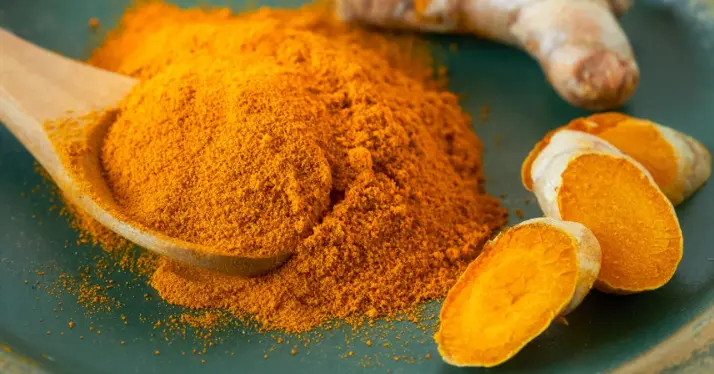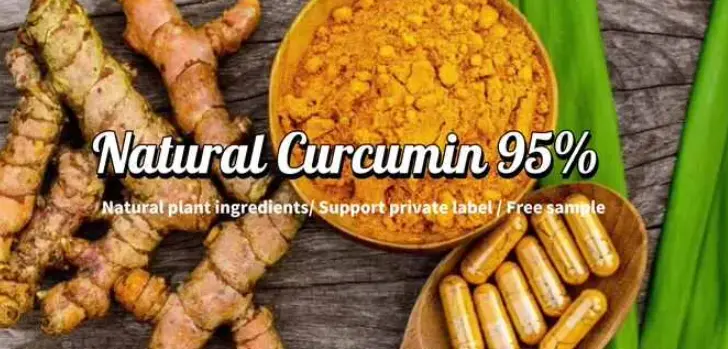How does curcumin work?
1. What is turmeric good for?
Turmeric is a spice that is rich in phytonutrients that may protect the body by neutralizing free radicals and shielding the cells from damage. The active ingredient in turmeric is curcumin, which has both antioxidant and anti-inflammatory properties. Anyone who is trying to manage inflammation could benefit from adding some turmeric to their diet. Inflammatory conditions that could benefit from turmeric include arthritis, other joint disorders, colitis, allergies, and infections. Diets rich in plant-based foods are associated with prevention of medical conditions such as cancer and heart disease.
Turmeric has a warm, bitter taste and is frequently used to flavor or color curry powders, mustards, butters, and cheeses. Because curcumin and other chemicals in turmeric might decrease swelling, it is often used to treat conditions that involve pain and inflammation.

2.How Curcumin Works?
In addition to the ways we typically use curcumin, it seems that curcumin can also specifically target molecules and pathways in the cell cycle. It also acts as a blocker to inflammatory cytokines and enzymes, including COX-2, the target of the drug Celebrex. These properties are why studies show it can be beneficial to people suffering from osteoarthritis. One 2021 review of 15 trials showed that curcumin provided relief from pain and stiffness as well or better than ibuprofen or Celebrex, with the added benefit of lacking the potential side effects of NSAIDs. Trial doses ranged from 40 to 1,500 mg of curcumin.
Other research suggests that low doses of curcumin may help restore a normal balance between T cells that cause inflammation (Th17 cells) and those that protect against it (regulatory T cells). An imbalance in these cells is believed to drive lupus, rheumatoid arthritis and other autoimmune diseases. In one small randomized controlled trial, twice daily doses of either 250 or 500 mg of curcumin were compared to placebo. Both doses significantly outperformed placebo on all measures. They reduced disease activity and significantly lowered inflammation markers and rheumatoid factor (RF) values.
3.Health Benefits of Curcumin(Turmeric)?
Curcumin is the main active ingredient in turmeric. Turmeric is native to Southeast Asia, but is popular all over the world. It is perhaps most popular in India, where it is one of the main spices in curry powders. Its flavor is warm and bitter, and it has a striking yellow color. Turmeric has been reported to have many health benefits. Its use as a medicine dates back nearly 4,000 years. Curcumin is a bioactive compound and is what gives turmeric its bright color. It was first isolated by scientists around the turn of the 20th Century, and its antibacterial properties were first demonstrated in 1949. Subsequent research showed it to have anti-inflammatory properties, antioxidant properties, and several other marked benefits.
4.Do Curcumin Supplements Have Drawbacks?
Because curcumin seems to have anti-inflammatory and pain-relieving effects, many people wonder why curcumin supplements are not recommended more often. There are three primary reasons: Poor absorption. Curcumin tends to be rapidly metabolized and is not easily absorbed into the blood stream, which limits its anti-inflammatory and pain-relieving properties. Scientists are investigating potential supplement additives, such as pepper, that could improve curcumin absorption. More research is needed. Scientists are still learning about what turmeric and curcumin do and how to best harness their natural medicinal capabilities. Supplements are unregulated. The US Food and Drug Administration does not regulate supplements, so supplement potency may vary from brand to brand and even batch to batch in the manufacturing process. A supplement labeled as containing 95% curcuminoids may actually contain more or less than the label states. Not surprisingly, some health care providers and arthritis patients are uncomfortable with this variability in reliability.
Reference:
https://www.hopkinsmedicine.org/health/wellness-and-prevention/turmeric-benefits
https://www.arthritis.org/health-wellness/healthy-living/nutrition/anti-inflammatory/turmeric-wont-help-arthritis
https://www.webmd.com/diet/health-benefits-curcumin

 Food Additives
Food Additives










